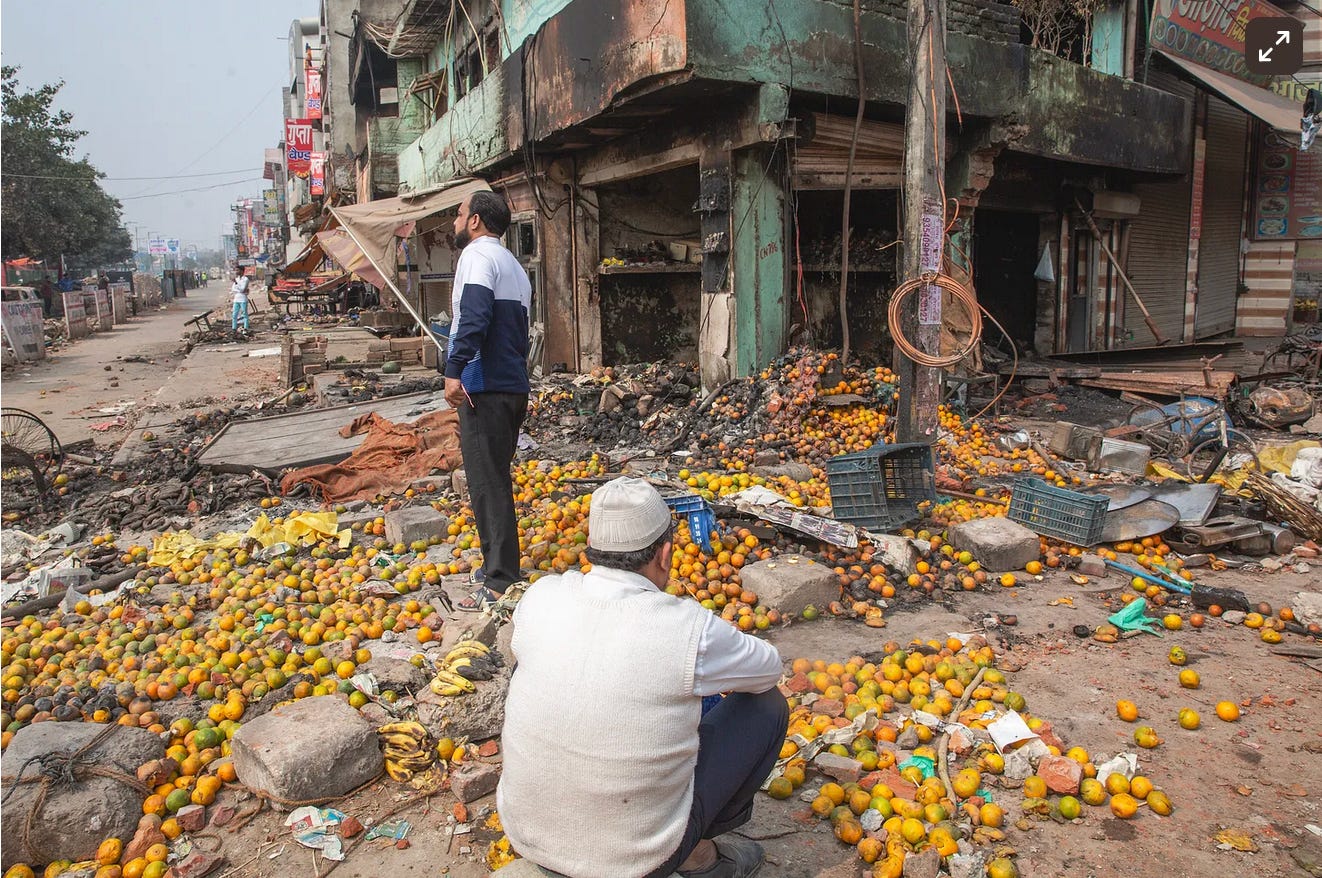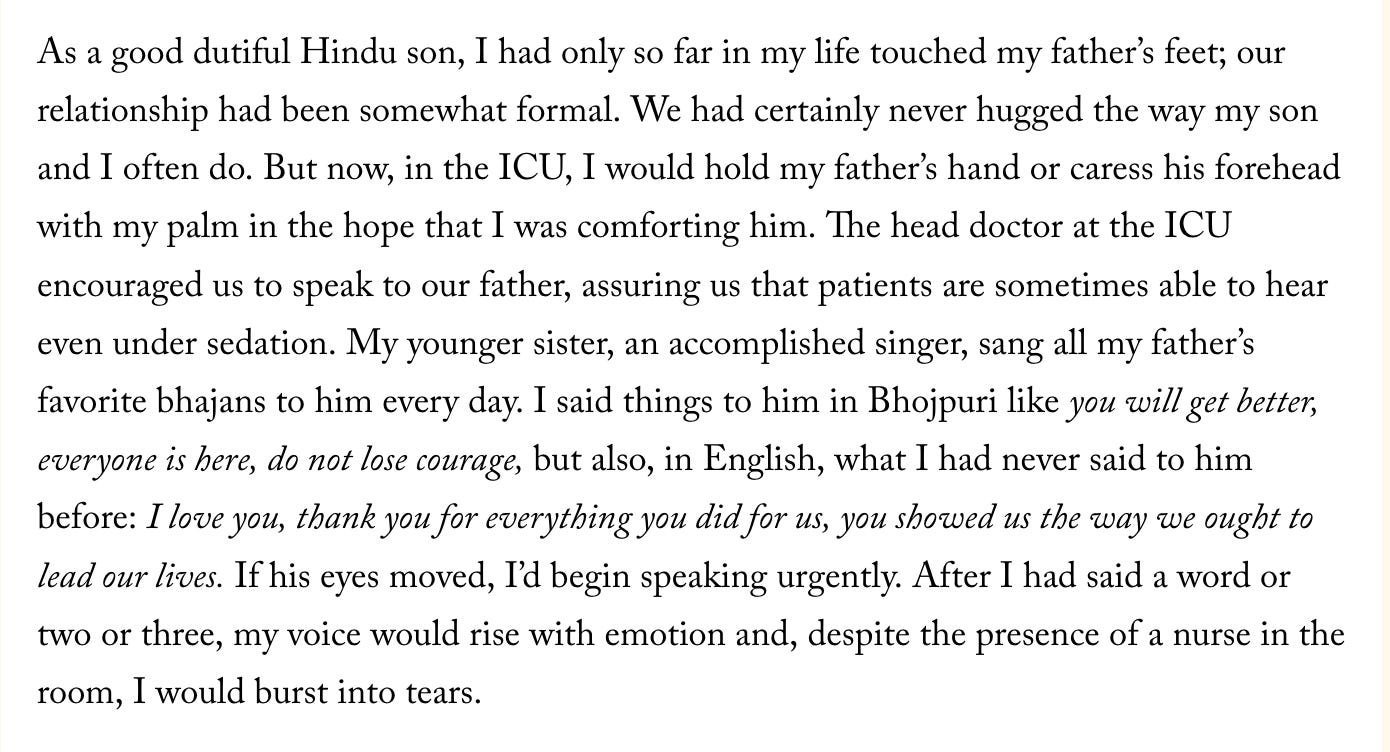Illness As Metaphor
Daily encounters in Delhi
Shaunak Sen, director of “All That Breathes”
Last month in Delhi, soon after I got to India, I sat down with my friend Shaunak Sen and asked him what he had been warning me about in his texts. He had said that he had some news that he could share only in person. I could see that he had lost weight but he appeared okay. He said that a tumor had been found in his kidney.
We talked for a long time and ate dinner. Shaunak was excited by the medical help he had found, in particular Dr Ambarish Satwik who he thought I must have met at literary festivals. And then he said, not without some excitement, that he had decided to make a film about surgeons. He was now almost looking forward to his surgery.
When we came out of the restaurant, we walked around for a bit, first to a bookstore and then the rest of the market. Shops were pulling down their shutters. A shoemaker was doing the last of his work. I took a picture of Shaunak and asked him to write down about his illness and also say something—anything—about the condition in India. You can read what he wrote above.
That was a month ago. Shaunak underwent his surgery; it was a successful but not uncomplicated. After the surgeons found that the kidney that was being operated upon was continuing to bleed, they had to take more extreme measures. Instead of small cuts for robotic surgery, what was now required was a much longer incision. When the surgery was complete, Shaunak needed 65 stitches. I didn’t think I could bear looking at his wound and settled for a photograph.
“You look like a riot victim,” were the words that tumbled out of my mouth.
“Exactly,” Shaunak said. That had been his first thought too.
Riot victims had been on my mind because the previous day I had gone to Bhajanpura in north-east Delhi where, in February 2020, Hindu mobs had torched Muslim homes and businesses. There had been bloodshed; the majority of the dead were Muslim, and the overwhelming majority of those subsequently jailed were also Muslim. I was accompanied by the photojournalist Ishan Tankha who had taken pictures of the violence back in 2020. My interest was in one photograph that Ishan had taken of a mass of oranges scattered on the ground. Two male figures, bent in grief, occupied the foreground. In the background was a smoke-blackened shop. When we arrived on the dusty, crowded street, there was a man nearby removing the covers from his fruit-cart. Ishan showed the photograph to the man whose name was Danish. Did he know the men whose backs could be seen in the image?
Tears sprang into the fruit-seller’s eyes. The two men were his maternal uncles. His own fruit-stand had also been set ablaze. It had taken him a year to set-up his business again. As he went about his day now, putting apples, oranges, pomegranates, grapes, in open crates for sale, he said that to recall those days makes the hair on his arm stand. One of his daughters, who was eleven when the riots took place, didn’t want him to ever leave home. “Papa, baahar mat jaao.” Danish had feared for his life; he thought he too would be killed. They had survived and, like him, his uncles were also able to recover after the devastation. It had taken two years or more. At first, one of his uncles had only sold vegetables for a year because he had lost everything and didn’t have any money to purchase fruits to sell.
Back in the living room of the flat that belongs to Shaunak’s mother, the place where Shaunak grew up, we began talking about death. I can’t remember how we arrived on that topic: we were talking, not without mutual excitement, about the way shooting had gone during Shaunak’s surgery and the way in which he was going to structure the narrative. We arrived at the topic of death perhaps because I had mentioned to him that at the book launch for The Green Book that evening, I was going to read a bit about my father’s death and my trip back to Manikarnika a few months later. Shaunak’s father had died during the shooting of “All That Breathes” and the film is dedicated to his memory. I then asked him how his father’s death and he pointed to the next room. That had been Shaunak’s room when he was living with his parents. Shaunak had returned late that night after a shoot. Early in the morning, around five, his father had come into the room to close his curtains so that the early morning light didn’t wake him up. This was something that Shaunak’s father did every day: he stepped into the room and used a clip to pin the two curtains together. This ensured that the no morning light entered the room. That particular morning, Shaunak heard a thud. He woke up and saw his father sitting on the floor. Why are you sitting on the floor? He was a bit miffed when his father didn’t respond. He asked this question and then repeated it when he didn’t get a response. His father just kept looking at him. With more than a touch of annoyance, Shaunak said, “You don’t need to do this. You have woken me up.”
Then he said, “Baba?”
His father had suffered a stroke. Shaunak took his father down the two floors—not an easy task carrying a body in a comatose state—and then to the hospital. The doctors said that there had been heavy hemorrhaging; a neurological surgery could be performed but the chances of his father surviving the operation was miniscule, maybe 0.5 percent. Faced with taking a decision alone, Shaunak Googled “Do coma patients feel pain?” He found out that they do. He didn’t want his father’s body to experience any pain. He decided against surgery. When he communicated his decision to the relatives assembled outside in the corridor, his younger uncle said that Shaunak was acting like a murderer. To which Shaunak could only respond by saying that he at least wasn’t acting like a torturer.
Shaunak took this picture while he and I chatted in his mom’s place.
During the book launch that night, my publisher was in the audience and he asked me a question about keeping a journal. I had offered a quote from one of Oscar Wilde’s plays: “I never travel without my diary. One should always have something sensational to read on the train.” In response to the question, I took out the tiny notebook I had in my breast-pocket. I said that a friend had earlier that day told me that when his father was dying he had Googled “Do coma patients feel pain?” I had written the question down in my journal because I didn’t want to forget the story that Shaunak had told me. His story had reminded me also of all the times during March 2023 when my father was lying in a coma in the ICU and I had tried to speak to him:






It just so happens that in the eleven days of this new year, I've read three of your Substack essays and heard your latest podcast episode on The Seen and the Unseen. Every encounter, of words written or spoken, has made me pause and think, and it has been a great learning. Thank you!
So moving. Thanks for writing this and sharing it here. Wishing Shaunak a speedy recovery!